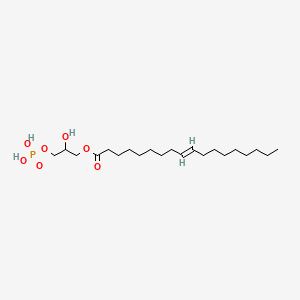lysophosphatidic acid
lysophosphatidic acid is a lipid of Glycerophospholipids (GP) class. Lysophosphatidic acid is associated with abnormalities such as Atherosclerosis, Alzheimer's Disease, Asthma, Diabetes Mellitus, Non-Insulin-Dependent and Septicemia. The involved functions are known as Inflammation, Chemotaxis, Binding (Molecular Function), Polymerization and Inflammatory Response. Lysophosphatidic acid often locates in Cytoskeleton, Microfilaments, actin cytoskeleton, Extracellular and Structure of germinal center of lymph node. The associated genes with lysophosphatidic acid are TNF gene, MAPK3 gene, RHOA gene, CDC42 gene and ADRBK1 gene. The related lipids are lysophosphatidic acid, Lipopolysaccharides, Lysophosphatidylcholines, Lysophospholipids and Phosphatidic Acid. The related experimental models are Knock-out, Transgenic Model, Rodent Model and Disease model.
References related to lipids published in J. Biol. Chem.
| PMID | Journal | Published Date | Author | Title |
|---|---|---|---|---|
| 27405756 | J. Biol. Chem. | 2016 | Tong S et al. | Structural Insight into Substrate Selection and Catalysis of Lipid Phosphate Phosphatase PgpB in the Cell Membrane. |
| 25528375 | J. Biol. Chem. | 2015 | Ohshima N et al. | New members of the mammalian glycerophosphodiester phosphodiesterase family: GDE4 and GDE7 produce lysophosphatidic acid by lysophospholipase D activity. |
| 25035428 | J. Biol. Chem. | 2014 | Morales-Lázaro SL et al. | Structural determinants of the transient receptor potential 1 (TRPV1) channel activation by phospholipid analogs. |
